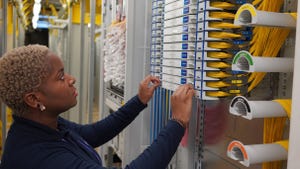April 3, 2009

BT Wholesale is preparing to launch a content delivery network (CDN) service to British ISPs that are buckling under the strain of increasingly heavy video traffic loads.
Ryan Hardy, a senior product manager at the wholesale division of BT Group plc (NYSE: BT; London: BTA), tells Light Reading the new offering, called Wholesale Content Connect (WCC), will be launched as a pilot service before the end of 2009.
He says the main reason for offering the service is "to address video over broadband, including the Canvas project." Canvas is a joint U.K. initiative led by broadcasters British Broadcasting Corp. (BBC) and ITV plc (London: ITV), along with BT, to develop a standardized way to deliver broadcast-quality, on-demand video services over the Internet. (See BBC, BT, ITV Team Up, BBC Consults on IPTV, and More Light Shed on the BBC's Canvas.)
Hardy says the idea behind WCC is to "make broadband a video platform. It's important to get ISPs into this value chain, and it will enable ISPs to charge content providers for the delivery of their content." For example, ISPs could charge the BBC for the delivery of its increasingly popular iPlayer on-demand service, which has put some ISPs' access and backhaul connections under considerable strain.
(It's worth noting here that U.K. cable operator Virgin Media Inc. (Nasdaq: VMED) is building its own internal CDN to deal with iPlayer and other video applications. See Virgin Media Weighs CDN Options.)
Hardy says the service will be a "next-generation CDN. It will have functions that will give our CDN service unique selling points, such as QoS [quality of service] and broadcast-quality TV capabilities," something a traditional CDN service provider such as Akamai Technologies Inc. (Nasdaq: AKAM) can't offer, he claims.
"We'll be able to do targeted ad insertion and provide the set-top boxes. This is all about giving the ISPs the tools to build a new service. It's something they've been looking for since they experienced the impact of the iPlayer," demand for which is still growing fast: According to the BBC, there were 11.2 million iPlayer download requests in January 2008, but by December 2008 this had risen to 41 million.
The iPlayer launched in July 2007 and quickly began clogging up the U.K.'s networks. Hardy says once the problem became clear, BT set to work on "reducing our costs internally, and now we're looking to pass on those cost benefits to the ISPs. But it's not just about reducing costs -- it's also about creating a new revenue stream." The ISPs see Canvas, which aims to make it easy for any content owner to get its products to end users with a high level of service assurance, "as a great revenue opportunity."
To Page 2
Under development
The WCC service is still under development, with BT hopefully about to learn about the nature of the beast from a controlled pilot scheme.
Hardy says BT is working "with a number of ISPs and a content provider to trial Content Connect. This is a limited trial that we plan to run" some time between now and the end of June. BT hopes for an end-of-year pilot launch that would "catch-up TV to PCs over broadband. Broadcast-quality TV delivery will come later, in the following year," says Hardy.
Publicly available documents, that have been used to inform ISPs about BT's CDN plans, show the trial is set to involve 2,000 end users and the delivery of BBC iPlayer content.
As for the technology it might deploy, Hardy says those decisions are yet to be made.
"We're in the middle of an ITT [invitation to tender]. We're looking at a number of different options, including building our own [CDN] or partnering with an existing CDN player and bringing that into our network."
While the BT man declined to elaborate on the potential choices, his description of the ongoing process suggests that BT might turn to a CDN specialist such as Velocix , which recently expanded its business with the launch of access node equipment designed to be deployed in ISP networks. (See Velocix Launches Metro Kit.)
Velocix had not returned calls as this article was published.
Whatever route BT Wholesale takes, Hardy says delivering CDN capabilities to its ISP customers, which include sister company BT Retail, will involve the integration of new technology into BT's current network architecture, but won't involve any kind of overlay network.
It'll also involve adding new technology to the carrier's 20th Century (20C) network, as well as the next-generation network, the 21C (or 21CN as it's more widely known), that's currently being built out.
"We're adding capabilities to the 20C because that's where the market is right now, but the 21C will have all the bells and whistles that can provide such features as multicast, broadcast-quality TV. It involves the integration of video and storage servers into the broadband network." That means BT can make the wholesale CDN service available to its regular wholesale customers and to the local loop unbundling (LLU) companies that install their own broadband equipment in BT's local exchanges, Hardy says.
Whatever BT Wholesale decides to do, it won't need a major budget rethink. "It'll be a pay-as-you-grow investment -- this is a low risk, low capex approach."
And what about taking the service into other markets? Is this going to be a local offering only? "We'll play to our strengths," says Hardy. "There's a great opportunity in the U.K., so that's where we'll begin. There are no current decisions beyond that, and we'll evaluate as we go along."
BT joins a growing list of traditional telecom operators looking to offer an alternative to CDN specialists such as Akamai and Limelight Networks Inc. (Nasdaq: LLNW). (See AT&T Develops Its CDN Business, Global Crossing Announces CDN Partnerships, DT Gets Into the CDN Business, Verizon Targets CDN Partners, Verizon & Velocix Team Up for CDN Services, Level 3 Increases CDN Capacity in Asia/Pac, and Tata Enters Global CDN Market .)
You can find a detailed guide to the leading independent CDN players at our sister site, Contentinople.
— Ray Le Maistre, International News Editor, Light Reading
You May Also Like










